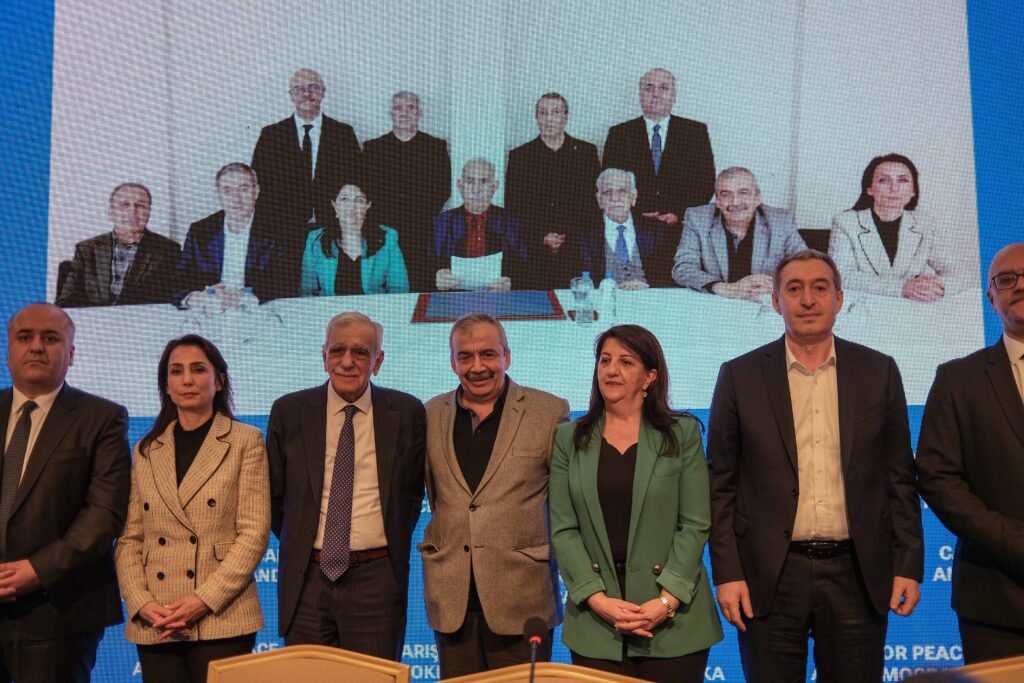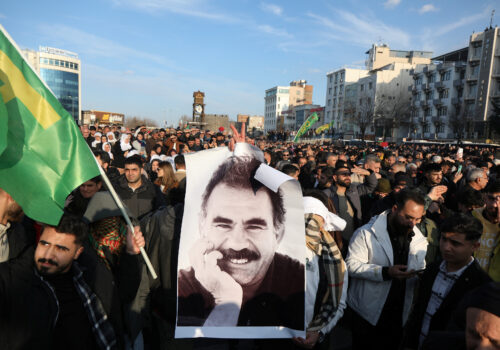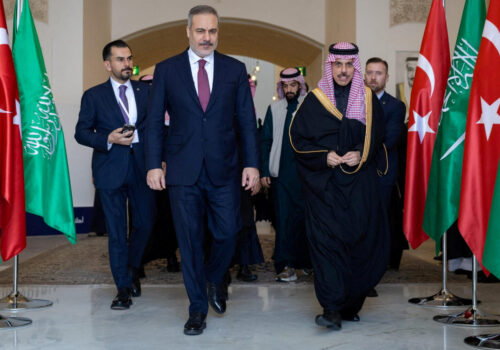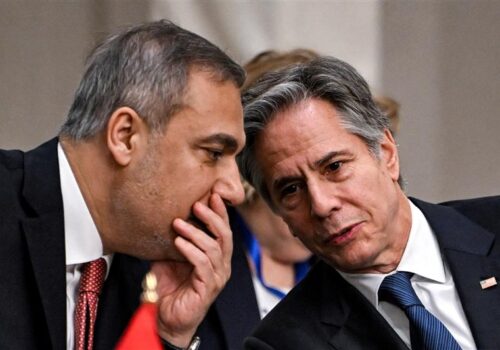On Saturday, the Kurdistan Workers’ Party (PKK)—a militant group that has fought the Turkish state for decades—declared an immediate cease-fire.
The cease-fire announcement comes after Abdullah Öcalan, the imprisoned leader of the PKK (which is designated a terrorist group by the United States, European Union, and others), issued a long-awaited statement on Thursday telling the group to lay down its arms and dissolve. His message touched upon the themes of respecting national borders, renouncing armed struggle in favor of political engagement, and shifting from an ethnonationalist agenda to a broader push for democratic reforms.
Many are questioning whether this is truly the beginning of a historic resolution, seeing as it would depend on PKK-linked groups to follow through with disarming dissolving. But, as the Kurdish question has become a regional one, the significance of the cease-fire and Öcalan’s call will also depend on how regional alliances and power balances unfold.
The backdrop
The statement wasn’t unexpected. It comes after a political development in October 2024—one that caught everyone off guard.
Nationalist Movement Party (MHP) leader Devlet Bahçeli, known not only as a staunch defender of Turkish nationalism but also as a pillar of the state tradition, signaled a potential shift in policy when he shook hands with pro-Kurdish political party representatives in the Turkish parliament. He later stated that Öcalan could see his prison conditions eased if he called on the group to lay down its arms. This moment marked a profound shift in the Turkish state’s approach to the Kurdish issue, signaling a potential departure from its long-standing policies.
For those observing the issue from within Turkey, this turning point was deeply perplexing. Key leaders of the Kurdish political movement, including its most popular political figure Selahattin Demirtaş, remained behind bars. In 2024 and 2025, the Turkish government appointed trustees to replace elected mayors from the pro-Kurdish People’s Democracy and Equality Party (DEM Party) and the Republican People’s Party (CHP) following arrests on terrorism charges. This practice impacted Kurdish-populated municipalities including Hakkari, Mardin, Batman, and Istanbul’s Esenyurt district. The Kurdish opposition also faced a large-scale crackdown. Concerns over Turkey’s democracy had reached their peak as discussions on the Kurdish issue were gaining momentum.
Analysts argued that Erdoğan’s efforts were aimed at amending the constitution to extend his presidency as, after being elected three times, he would be constitutionally banned from running in the 2028 elections. In this context, securing new coalition partners—particularly Kurdish support—became crucial for obtaining the backing needed to pass constitutional changes that would enable him to seek another term.
But throughout discussions on the Kurdish issue, Erdoğan refrained from taking a direct role and largely delegated communication of the process to Bahçeli, in what seems to be a deliberate effort to separate his political future from the negotiations. This choice reinforces the notion that the “opening” was not merely a political maneuver but a broader state-driven initiative. In fact, the first statement from the government side came from Justice and Development Party Deputy Chairman Efkan Ala, who said, “The essence of the call is for the laying down of arms and the dissolution of the terrorist organization. We focus on the outcome.”
Ala’s response not only seeks to frame the issue primarily as one of disarmament but also underscores the uncertainty surrounding its feasibility. This uncertainty is compounded by the fact that a call from an imprisoned leader does not guarantee compliance, especially given the internal divisions, conflicting interests, and shifting power dynamics that often characterize armed movements such as the PKK. Over time, factions may develop autonomy from their original leadership, further complicating the prospects of a unified response. Given these complexities, the likelihood of a definitive outcome remains uncertain.
All this raises a critical question: Why would the PKK be willing to lay down arms?
The Syrian dimension
These events appear to be part of a broader strategic realignment with far-reaching geopolitical implications, particularly concerning Syria. It is a realignment not only for Ankara—which is shifting its approach to the war in Syria—but also for the PKK, whose regional strategy is evolving. Both actors are recalibrating their positions in response to changing regional dynamics, international pressures, and the balance of power in Syria.
The PKK’s regional strategy is closely intertwined with the trajectory of Syrian Kurds. First, while the Democratic Union Party (PYD) in Syria is formally distinct from the PKK, its connection to the PKK is rooted in recruitment patterns and strong sociological ties. Historically, Syria has been a crucial source of PKK fighters, with fluid movement between the two organizations. Additionally, the PKK’s leadership and ideological influence have played a significant role in shaping the PYD’s political vision, resulting in continuity between their strategies and objectives. But while the PKK is designated as a terrorist organization by the United States and the European Union, the PYD is not classified in the same manner, leading to differing international approaches toward the two groups.
Second, when the Ba’athist regime withdrew from Kurdish-majority areas at the beginning of the civil war, Syrian Kurds established a quasi-state with military, administrative, and judicial structures. For the first time, they governed autonomously, consolidating territorial control and legitimizing their authority through legal and institutional mechanisms. This transformation not only solidified the PYD’s position as a key regional actor but also secured the party international support; notably, the group’s participation in the fight against the Islamic State of Iraq and al-Sham (ISIS) attracted the support of the United States. Consequently, Syrian Kurds’ self-governance and efforts to strike international alliances demonstrated the strategic advantages of state-building and diplomacy, making the goal of securing the PYD’s future appear both more feasible and strategically sound for the PKK.
Following the ousting of Syrian dictator Bashar al-Assad in December 2024, Syrian Kurds find themselves at a pivotal moment. Beyond maintaining their autonomous enclave, they seek formal recognition and legal integration into Syria’s evolving political structure. Öcalan’s call aligns with this broader geopolitical shift as it implicitly advocates for Kurdish groups in Syria to be recognized as legitimate legal entities within the state framework. Like Hayat Tahrir al-Sham’s (HTS’s) transition from an insurgent group to a governing force, the PYD is undergoing a parallel transformation, seeking to establish itself as a legally recognized political actor in the region.
Turkey’s calculations
Whether this transformation materializes depends on Turkey’s readiness to soften its stance toward the PYD in Syria and willingness to reconsider its perception of Syrian Kurdish governance as an existential threat. However, for Turkey to shift its position, two key conditions must be met: first, a clear decoupling of the PYD from the PKK, and second, the neutralization of the PKK threat through disarmament and credible guarantees that current borders will remain unchanged. In essence, while Öcalan’s call for disarmament does not directly pertain to the PYD (as Mazloum Abdi, commander of the Syrian Democratic Forces, immediately clarified), it remains a sine qua non for Turkey to reconsider its stance and open the door for political negotiations with the PYD.
If Turkey were to soften its stance, it would not only ease US policy concerns and reduce US-Turkey tensions but also contribute to a more stable security framework in Syria. The Kurdish-led administration acts as a counterbalance to HTS, maintains close cooperation with the United States, and is widely regarded as a secular alternative to Islamist factions. Moreover, the inclusion or exclusion of Kurds in Syria’s governance structure is a crucial factor in shaping the regional power balance, particularly in influencing dynamics between Turkey, the United States, Israel, and Arab states (many of these Arab states remain cautious of Ankara’s expanding influence in the region). The political integration of Kurdish actors into Syria’s future governance is thus a crucial step in, specifically, the United States’ efforts to ensure long-term stability in the region. This significance was underscored when the White House publicly welcomed Öcalan’s statement.
From ethnopolitics to geopolitics
While the Kurdish question has always had a geopolitical dimension, groups over the past decade have shifted from using ethnopolitical tools—such as cultural rights and political representation—to geopolitical strategies focused on regional security and strategic realignment. No longer confined to matters of identity and minority rights, the Kurdish question has become a regional issue, both shaping the broader power dynamics of the Middle East and being influenced by them.
As this shift blurs the distinction between internal and international politics, the nature of any potential resolution also changes. The terms of negotiation are no longer about cultural recognition or political inclusion but about strategic positioning and regional security. As Middle East academic Arzu Yılmaz points out, this is why the current process cannot be seen as a traditional peace initiative aimed at resolving historical grievances; rather, it is a process of alliance-building, in which regional alliances and power balances dictate the framework of engagement.
Whether the cease-fire and Öcalan’s statement mark the beginning of a lasting resolution or merely another phase in an ongoing regional power struggle remains uncertain. What is clear, however, is that it can no longer be understood—let alone resolved—within the borders of a single state.
Evren Balta is a professor of political science at Özyeğin University and a visiting scholar at the Harvard University Weatherhead Center for International Affairs. Follow her on X at @Evreki.
The views expressed in TURKEYSource are solely those of the authors and do not necessarily reflect the views of the Atlantic Council, its staff, or its supporters.
Further reading
Thu, Feb 27, 2025
Is this the end of the PKK and its conflict with Turkey?
New Atlanticist By Defne Arslan, Rich Outzen
Imprisoned PKK leader Abdullah Öcalan issued a call for the militant group to lay down its arms after four decades of conflict with the Turkish state.
Thu, Feb 20, 2025
Syria’s rebuilding is bringing US partners Turkey and Saudi Arabia closer together
TURKEYSource By Pınar Dost
Relations between Turkey and Saudi Arabia are deepening, opening up new possibilities and implications for the region.
Mon, Jan 6, 2025
Assad’s fall has created an opportunity for US-Turkey cooperation
TURKEYSource By Rich Outzen
Long a point of discord between Washington and Ankara, developments in Syria present an opportunity to return to cooperation.
Image: The delegation that met with PKK leader Abdullah Ocalan poses for the press after the statement. The delegation of the People's' Equality and Democracy Party (DEM Party) made a statement at Elit World Taksim in Istanbul following their third meeting with PKK leader Abdullah Ocalan, which also included a message from Ocalan, PKK leader Abdullah Ocalan who said, 'I am calling for disarmament and I take historical responsibility for this call.



